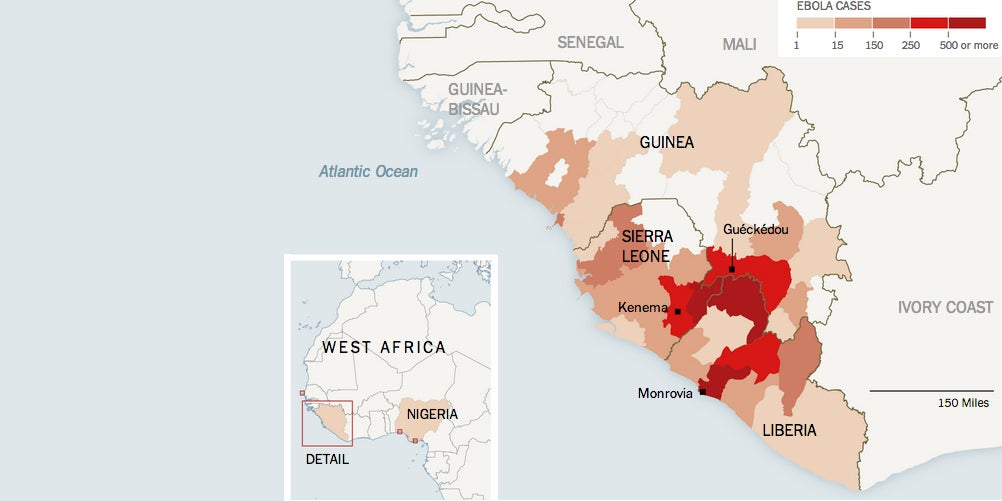College of Charleston Assistant Professor of Public Health Matt Page studies infectious disease, epidemiology and social determinants of health in the department of health and human performance. The recent Ebola outbreak in West Africa, primarily affecting Guinea, Liberia and Sierra Leone, combines Page’s research interests and creates topical fodder for his fall 2014 Epidemiology course.
Q: What is your academic background?
A: I was a history major as an undergraduate at the University of Michigan. I got my master’s in public policy at the College of William and Mary, then worked for about nine years and came back to school to get my doctoral degree in epidemiology at Emory University.
Q: How did you become interested in epidemiology and infectious disease?
A: I was interested in disease as a history major in college and I took a couple classes on it, specifically the impact of disease on American culture. Later, when I was working for a business that did consulting for pharmaceutical companies, I realized that the pharmaceutical companies were using epidemiological data and that sparked my interest all over again and motivated me to return to school.
Q: Where do you focus your research within your field?
A: I primarily focus on the social determinants of health, which examines the social, structural and psychosocial factors that impact people and their health decisions. For example, do people in certain geographic areas have access to health education? If they do, do they choose to ignore what they learn because other factors hold them back from taking necessary precautions?
The impact of social determinants of health is the most interesting topic to me, but also the hardest to teach because students often ask, ‘’Well, we know how to stop the spread of STDs, we know how to address obesity, so why can’t we stop them?” The truth is there are so many factors affecting the spread of those epidemics that there is no simple answer to those questions.
For the most part I study the social determinants of HIV and other sexually transmitted diseases, but it’s also relevant to the Ebola outbreak. We’re seeing healthcare workers and others who care for the sick and dying who may know how to avoid contracting Ebola, but who do not have the resources, such as proper protective gear, to take advantage of this knowledge.
Q: How have you been able to use the Ebola outbreak in your classes?
In my Epidemiology courses we have something called the ‘disease of the day,’ where two students each class present on different diseases. After the students present, I’ve been giving updates on Ebola about every other class.
Recently, health workers in Liberia quarantined a slum in Monrovia, the capital, to contain spread of the disease. So we talked about Liberia and the history of Liberia because was founded by United States citizens as a colony freed American slaves founded the country in the early 1800s. Liberia has been hit the hardest by this outbreak but no one in the class knew about the connection between the U.S. and Liberia.
Q: What else should the campus community know about the outbreak?
A: This is the first Ebola outbreak we’ve ever seen of this magnitude. Before this we’d seen outbreaks elsewhere in Africa but they’d been very small, localized outbreaks. This is the first epidemic that’s spread so extensively throughout multiple countries and the case count is skyrocketing.
As far as some statistics people should know, the World Health Organization (WHO) estimates that there could be 20,000 cases by early November 2014, and the Center for Disease Control (CDC) estimates that, worst case, there could be 1.4 million cases by the end of January. So we’re talking about an exponential growth of the disease if the appropriate response isn’t put in place.
Although the first U.S. Ebola case was diagnosed in Dallas on Tuesday, Ebola is unlikely to spread significantly to the U.S. since doctors are on alert for symptoms. The U.S. has hospitals that are equipped to treat Ebola patients, but students and campus community members should be aware of where the disease is occurring as they make any foreign travel plans.
Quick facts
- Isolation and quarantine are different: Quarantine is for people who have been exposed to the disease but who don’t necessarily have it. Isolation is for people who are confirmed to have Ebola.
- The Ebola virus is a virus that causes Ebola Virus Disease (formerly Ebola Hemorrhagic Fever). Ebola Virus Disease is the full name of the disease we’re hearing about.
- Some experts are concerned about the virus mutating to become more contagious – right now it can only be contracted through contact an infected person’s bodily fluids.
- Some Ebola vaccines and treatments are currently in testing, however none are FDA-approved and no cure currently exists.
Q: Do you think world leaders and health organizations are responding appropriately?
A: They’re starting to take it more seriously, although they should have taken it more seriously months ago. I think global public health often takes a back seat in the news to military events, but people need to consider public health problems like the Ebola outbreak as potential national security threats.
Now that the statistics are more heavily broadcast and the numbers are so dire, I think people, countries, and health organizations are stepping up to try to contain the outbreak.





